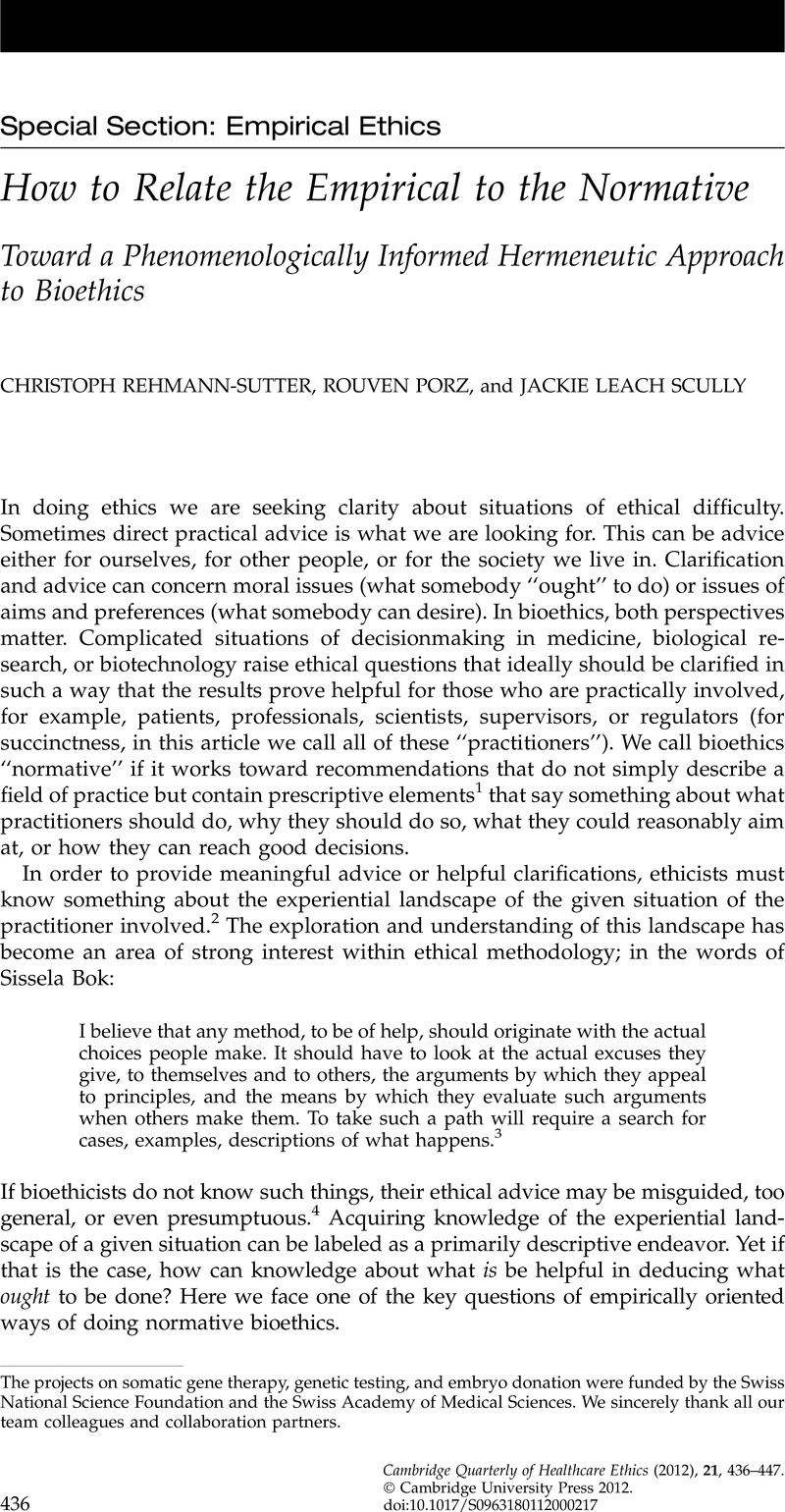Toward a Phenomenologically Informed Hermeneutic Approach to Bioethics
Published online by Cambridge University Press: 24 July 2012

1. Hare, RM.The Language of Morals. Oxford: Clarendon Press; 1952.Google Scholar
2. Shelton, W. The role of empirical data in bioethics: A philosopher’s view. In: Jacoby, L, Siminoff, LA, eds. Empirical Methods for Bioethics: A Primer. Amsterdam: Elsevier; 2008:13–20.Google Scholar
3. Bok, S.Lying: Moral Choice in Public and Private Life. New York: Pantheon Books; 1978:54.Google Scholar
4. Butler, J.Kritik der ethischen Gewalt: Adorno Vorlesungen. Frankfurt aM: Suhrkamp; 2003.Google Scholar
5. Fox, R, Swazey, JP.Medical morality is not bioethics—medical ethics in China and the United States. Perspectives in Biology and Medicine 1984;27:337–60.CrossRefGoogle ScholarPubMed
6. Jacoby, L, Siminoff, LA. Introduction. In: Jacoby, L, Siminoff, LA, eds. Empirical Methods for Bioethics: A Primer. Amsterdam: Elsevier; 2008:1–10.Google Scholar
7. Parker, M.Two concepts of empirical ethics. Bioethics 2009;23:202–13.CrossRefGoogle ScholarPubMed
8. Holm, S, Jonas, MF, eds. Engaging the World: The Use of Empirical Research in Bioethics and the Regulation of Biotechnology. Amsterdam: IOS Press; 2004.Google Scholar
9. Kon, AA.The role of empirical research in bioethics. American Journal of Bioethics 2009;9:59–65.CrossRefGoogle ScholarPubMed
10. De Vries, R, Gordijn, B.Empirical ethics and its alleged meta-ethical fallacies. Bioethics 2009;23:193–201.CrossRefGoogle ScholarPubMed
11. McMillan, J, Hope, T. The possibility of empirical psychiatric ethics. In: Widdershoven, G, McMillan, J, Hope, T, van der Scheer, L, eds. Empirical Ethics in Psychiatry. Oxford: Oxford University Press; 2008:9–22, at 19.CrossRefGoogle Scholar
12. See note 11, McMillan, Hope 2008.
13. See note 11, McMillan, Hope 2008.
14. Scully, JL, Rippberger, C, Rehmann-Sutter, C.Non-professionals’ evaluations of gene therapy ethics. Social Science & Medicine 2004;58:1415–25.CrossRefGoogle ScholarPubMed
15. Charmaz, K.Constructing Grounded Theory: A Practical Guide Through Qualitative Analysis. Los Angeles: SAGE; 2006.Google Scholar
16. Silverman, D.Doing Qualitative Research. 2nd ed.London: SAGE; 2005.Google Scholar
17. Smith, J, Flowers, P, Larkin, M, eds. Interpretative Phenomenological Analysis: Theory, Method and Research. Los Angeles: SAGE; 2009.Google Scholar
18. Rehmann-Sutter, C, Müller, HJ.Ethik und Gentherapie: Zum praktischen Diskurs um die molekulare Medizin. Tübingen: Attempto; 1995.Google Scholar
19. Haimes, E, Porz, R, Scully, JL, Rehmann-Sutter, C. “So, what is an embryo?” A comparative study of the views of those asked to donate embryos for hESC research in the UK and Switzerland. New Genetics and Society 2008;27:113–26.CrossRefGoogle ScholarPubMed
20. Haimes, E, Taylor, K.The contribution of empirical evidence to socio-ethical debates on fresh embryo donation for hESC research. Bioethics 2011;25(6):334–41.CrossRefGoogle Scholar
21. Mitzkat, A, Haimes, E, Rehmann-Sutter, C.How reproductive and regenerative medicine meet in a Chinese fertility clinic: Interviews with women about the donation of embryos to stem cell research. Journal of Medical Ethics 2010;36:754–7.CrossRefGoogle Scholar
22. Scully, JL, Rehmann-Sutter, C, Porz, R. Human embryos: Donors’ and non-donors’ perspectives on embryo moral status. In: Nisker, J, Baylis, F, Karpin, I, McLeod, C, eds. The “Healthy” Embryo: Social, Biomedical, Legal and Philosophical Perspectives. Cambridge: Cambridge University Press; 2010:16–31.Google Scholar
23. Rehmann-Sutter, C. Human embryos at the IVF-stem cell interface: Towards a hermeneutic approach to bioethics. In: Wüstenberg, RK, Heuser, S, Hornung, E, eds. Bonhoeffer and the Biosciences. Frankfurt aM: Lang; 2010:27–50.Google Scholar
24. Porz, R, Bürkli, P, Barazzetti, G, Scully, JL, Rehmann-Sutter, C.A challenged choice: Donating spare embryos to stem cell research in Switzerland. Swiss Medical Weekly 2008;136:551–6.Google Scholar
25. See note 3, Bok 1978.
26. Gadamer, H-G.Wahrheit und Methode: Grundzüge einer philosophischen Hermeneutik. 5th ed.Tübingen: Mohr; 1986:299.Google Scholar
27. See note 10, de Vries, Gordijn 2009.
28. Dodd, J, Stern-Gillet, S.The is/ought gap, the fact/value distinction and the naturalistic fallacy. Dialogue 1995;34:727–45.CrossRefGoogle Scholar
29. O’Neill, O, ed. The Sources of Normativity. Cambridge: Cambridge University Press; 1996.Google Scholar
30. Walker, MU.Naturalizing, normativity, and using what “we” know in ethics. Canadian Journal of Philosophy 1996;26:75–101.Google Scholar
31. Rehmann-Sutter, C. Wie kann Ethik orientieren? Überlegungen zur Orientierungsfunktion der Ethik am Beispiel der Life Sciences. In: Rusterholz, P, Schweizer, RM, Zwahlen, SM, eds. Aktualität und Vergänglichkeit der Leitwissenschaften. Bern: Lang; 2009:163–84.Google Scholar
32. Scully, JL.Disability Bioethics: Moral Bodies, Moral Difference. Lanham, MD: Rowman & Littlefield; 2008.Google Scholar
33. See note 30, Walker 1996:78.
34. Walker, MU. Introduction: Groningen naturalism in bioethics. In: Lindemann, H, Verkerk, M, Walker, MU. Naturalized Bioethics: Toward Responsible Knowing and Practice. Cambridge: Cambridge University Press; 2009:1–20, at 5.Google Scholar
35. Husserl, E.Ideas: General Introduction to Pure Phenomenology. London: Allen & Unwin; 1931.Google Scholar
36. Ricoeur, P. Phenomenology and hermeneutics. In: From Text to Action. New York: Continuum; 1991:23–50, at 30.Google Scholar
37. Widdershoven, G. Interpretation and dialogue in hermeneutic ethics. In: Ashcroft, R, Lucassen, A, Parker, M, Verkerk, M, Widdershoven, G, eds. Case Analysis in Clinical Ethics. Cambridge: Cambridge University Press; 2005:57–75.CrossRefGoogle Scholar
38. Scully, JL, Porz, R, Rehmann-Sutter, C. “You don’t make genetic test decisions from one day to the next”—using time to preserve moral space. Bioethics 2007;21:208–17.CrossRefGoogle ScholarPubMed
39. Haimes, E.What can the social sciences contribute to the study of ethics? Bioethics 2002;16:89–113.CrossRefGoogle Scholar
40. Haimes, E, Williams, R.Sociology, ethics, and the priority of the particular. British Journal of Sociology 2007;58:457–76.CrossRefGoogle ScholarPubMed
41. Wilson, D.Creating the “ethics industry”: Mary Warnock, in vitro fertilization and the history of bioethics in Britain. BioSocieties 2011;6:121–41, at 137.CrossRefGoogle Scholar